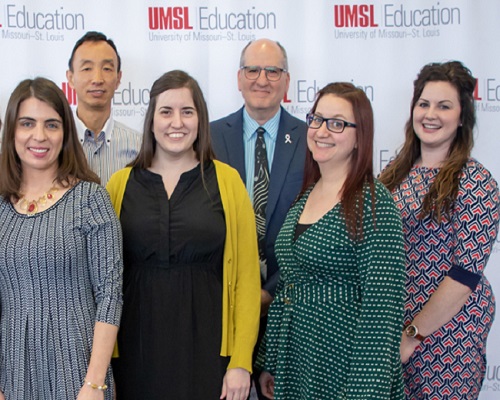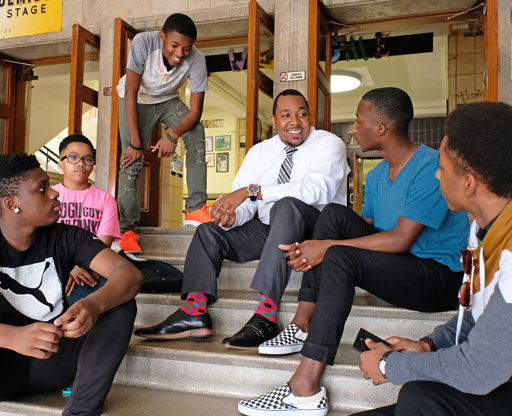Fostering Excellence in Counseling Research and Practice - PhD in Education, Counseling.
The Ph.D. program in counseling is based on a researcher practitioner model; it is primarily designed to train researchers, scholars, academicians, and highly skilled practitioners with an emphasis on promoting social justice. We train Ph.D. students with the skills, attitudes, and knowledge valued in academic, research, and service-providing settings. Our program infuses social justice throughout the curriculum and prepares students to acknowledge and validate their clients’ complex and diverse cultural identities and fight against systemic issues of racism, sexism, classism, ableism, homophobia, and other forms of social injustices. The Ph.D. deepens a student's counseling knowledge and builds refined research, teaching, supervision, counseling, and leadership and advocacy skills.
Our program consistently attracts diverse students from across the nation as well as internationally. Students achieve high levels of competency in the areas of research, supervision, teaching, leadership and advocacy, and clinical work. Faculty offer intentional and ongoing support to Ph.D. students throughout their time in the program to help ensure their success.
Earn your degree from the best.
UMSL’s PhD in Education, Emphasis in Counseling program holds advanced accreditation by the Council on Accreditation of Counseling and Related Educational Programs (CACREP) – the only doctoral counseling program in Missouri that holds this prestigious accreditation. It is also one of the only counseling PhD programs in the country that offers students the opportunity to complete a multiple-article dissertation format which puts students in a better position to publish multiple articles from their dissertations. View the 2023 CACREP report.
Program type:
Degree, PhD
Format:
On-Campus
Take the next step
Request more information below:

Why earn a PhD in Education with an emphasis in Counseling from UMSL?
The Ph.D. program is a beacon of quality and excellence in training scholars, researchers, academicians, and practitioners in the field. Our program deepens students' counseling knowledge and builds refined research, teaching, supervision, counseling, leadership, and advocacy skills. Students are lead by a faculty of exceptional teachers who are experts in their respective fields, ensuring the highest level of quality in education and mentorship.
The Ph.D. degree internship (a 600-contact hour field experience) requires a combination of research activity, graduate teaching, supervision experience with master’s-level students, leadership and advocacy, and counseling practice in a balanced that students design with the advisors and committees to meet their unique career goals. The Department has a counseling social-justice-focused training center on campus, the Counseling and Social Advocacy Center (CSAC), where students get practical experience under close supervision.
Outcomes and Career Outlook
UMSL’s PhD in Education, Emphasis in Counseling program is nationally recognized and regularly graduates students who go on to make meaningful and lasting contributions to the field. Many graduates of the program are practicing counselors or counselor educators in academic positions at major universities throughout the nation and beyond. In fact, the completion rate for this PhD program is about 96%, and our students are consistently able to find advanced jobs in the field after they graduate – at an average of about 98%.
UMSL’s program objectives describe student learning outcomes that all graduates of our programs should meet. These objectives reflect knowledge and projected counseling practice needs for counseling professionals in a diverse society. Upon completion of the program, graduates will be able to:
- Demonstrate awareness and abilities in promoting equity and justice in the face of systemic oppression.
- Demonstrate ethical and culturally relevant helping relationship and conceptualization skills to help facilitate client growth.
- Apply the process and practice of clinical supervision and consultation, through the utilization of theory, assessment, gatekeeping, and ethical and culturally relevant strategies.
- Design course content and assessment methods while integrating andragogy, differentiation, and gatekeeping awareness and skills in teaching.
- Develop rigorous, ethical, and intentionally designed counseling research utilizing qualitative and quantitative methods.
- Disseminate scholarship and research in professional presentations and/or publications.
- Demonstrate leadership by integrating knowledge of models and approaches to leadership in the program, community, or field.
- Create plans for advocacy for the profession, for clients, and with marginalized populations to stand up against systemic inequity.
Many graduates of the program are practicing counselors or counselor educators. Graduates of the doctoral program have been placed in academic positions at major universities throughout the US.
Employment of Educational Leaders is projected to grow up to 7% to 2030, with a median annual salary of $99,940, according to wage and employment data from the Occupational Information Network.
99,940
7
Career Opportunities
- Clinical Supervisor
- College/University Professor
- Director of Counseling
- Educational Consultant
- Higher Education Administrator
- Mental Health Advocate
- Mental Health Supervisor
- Researcher in Counseling and/or Education
- School Counseling Director
- Social Service Counselor
- Youth Counselor Supervisor
Plan of study
Review Full Degree RequirementsNon-Missouri Residents: Prospective students are responsible for reviewing the NC-SARA state authorizations page to see if this program is offered in their state throughout their program and to review the licensure or certification requirements for the state in which they reside.
Application Process
Q: How do you apply for the program?
A: Get your materials together and apply online. See the doctoral application checklist for specific application requirements.
Q: When is the application deadline?
A: November 1 for fall admission in the following year.
Application Requirements
Q: What are the application requirements?
A: Complete and submit the online Graduate School application. Visit the How to Apply page on the Graduate School website.
In addition to the general requirements for admission to the Graduate School, other special provisions apply to international students. Prospective students should contact the Office of International Student Services (Phone 314-516-5229; e-mail: iss@umsl.edu or visit the website of the Office of International Student and Scholar Services). International requirements for graduate admissions can also be found on the UMSL Global website.
- Pay the application fee if you are a first-time UM-St. Louis graduate student
- Request an official transcript of each University you have attended to be sent to the Graduate Admissions Office.
- Request letters of recommendation to be submitted to the Graduate Admissions Office. Use the standard graduate school forms. Three letters of reference are required.
- Submit your professional resume or curriculum vitae (CV) through the electronic application system. The document must be in PDF format.
- Submit a copy of a paper you have written on a scholarly topic as a writing sample through the electronic application system. Please limit to 20 pages or less. The document must be in PDF format.
- Answers to the questions below. Please provide typed (double spaced) questions and responses that are saved as a PDF document and submitted through the electronic application system. Please limit your responses to about 300 words per question:
- How do you envision the University of Missouri—St. Louis doctoral program preparing you to meet your career goals?
- Briefly describe your experiences working with diverse populations and what you have learned from those experiences.
- What personal qualities do you possess that relate to your interest in doctoral education in counseling?
- If accepted into the program, which of the faculty members are you interested in working with?
Important Note: All document submissions must be in PDF format. Review the Frequently Asked Questions (FAQ) webpage.
Q: What transcripts do I need to submit?
A: Admission to all graduate programs at UMSL require official transcripts from every college or university you have attended. International students must request official certified transcripts. International students should contact International Student and Scholar Services with any questions or for more detailed information.
Official transcripts must be received directly from the issuing college/university. We can receive them via paper mail or electronic submission.
Unofficial transcripts may be uploaded into your online application. Please note that this is optional. If/when you are admitted to the university, you will need to have official copies sent.
UMSL Alumni: Your undergraduate records are accessible by Graduate Admissions and you do not need to send an UMSL transcript or resend previously submitted final transcripts.
Send transcripts to the following addresses:
| Domestic Students | International Students / International Universities |
| University of Missouri - St. Louis Graduate Admissions 121 Woods Hall 1 University Blvd. Saint Louis, MO 63121-4400 gradadm@umsl.edu |
University of Missouri - St. Louis International Student Services 362 Social Sciences Building 1 University Blvd. Saint Louis, MO 63121-4400 iss@umsl.edu |
Q: What makes a successful candidate for this program?
A: The UMSL faculty reviews all applications holistically within the context of each individual’s life experiences and identities. So, even if you do not meet all of the following requirements, we still encourage you to apply! An undergraduate and graduate GPA of at least 3.5, work experience as a counselor, a social justice orientation, excellent recommendation letters, strong writing ability, and demonstrated potential for scholarly work (e.g., research, presentations) are preferred.
Q: What happens after I submit my application?
A: The counseling faculty will review all applications and some prospective students will be invited for a Zoom interview in December or January. The daylong interview will consist of a group activity, a writing sample, individual interviews with faculty, opportunities to meet with current doctoral students, and more.
Q: Can I apply to the program with only a bachelor’s degree?
A: No, a master’s degree is required to be considered for the program.
Q: Can I apply to this program with a master’s degree from a different field?
A: Yes, but you may be required to take master’s level counseling courses unless you have completed related coursework in a similar field (e.g., counseling psychology, social work). You may transfer in a maximum of 45 credits from outside the program.
Tuition, Fees, & Funding Opportunities
Q: What scholarships, graduate apprenticeships, and other funding opportunities are available?
A: Numerous opportunities are available for scholarships, graduate assistantships, and jobs at UMSL. Most of our students who want a graduate assistantship are able to get one. Many students get jobs working on campus too. Graduate assistantships typically involve 20 hours of work per week either teaching courses or working as research assistants for a professor(s). Students who have graduate assistantships are not allowed to work off campus. Also, the UMSL College of Education dissertation and travel grant subcommittee offers opportunities for doctoral students to receive funding for travel to professional conferences and for their dissertation research. Information about these opportunities is sent out twice yearly each fall and spring through email.
Q: How much does the program cost?
A: For more information about the tuition and fees, visiting the Student Financial Services website.
Q: Are application fee waivers available?
A: Your fee can be waived if you have previously applied to the graduate school at UMSL or previously been enrolled as a graduate student at UMSL. It can also be waived if you are a veteran or a McNair scholar (You must submit a letter confirming this to the graduate admissions office).
Q: I paid an application fee for a previous graduate application; do I need to pay the fee again?
A: Once you have paid the application fee once, you do not need to pay it again, even if you submit multiple applications.
About the Program
Q: Is the doctoral program CACREP-accredited?
A: Yes.
Q: When are courses offered?
A: Most courses are offered on campus once a week from 5:30pm to 8:20pm. A few courses are offered synchronously or asynchronously online.
Q: What are the program course requirements?
A: See the 3 rd page of our doctoral application checklist for degree program requirements. The program includes a 600 hour internship split between at least 3 different experiences of the student’s choice (i.e., teaching, research, counseling, supervision, and leadership and advocacy). The program also requires a doctoral counseling practicum (typically taken during the fall and spring of the first year) that requires accruing counseling hours outside of class time. Additionally, the supervision class requires that students supervise multiple master’s level counseling students while taking the course.
Q: Can I transfer into the program from another PhD program?
A: Yes. Students who have completed a master’s degree in a CACREP-accredited program typically transfer in most or all of the required master’s level coursework for the program. Students can transfer in credits from non-CACREP-accredited master’s programs or from programs in related fields at the discretion of the faculty. Students cannot transfer in more than 30 credits from their master’s programs. For students transferring in from other doctoral programs over half of their coursework must be completed at UMSL (up to 45 credits).
Q: How long does the program take to complete?
A: Our program is structured in a way that is flexible based on the lives of our students. Our doctoral students go through the program at different speeds, but typically students complete the program in about 4 to 5 years.
Q: What opportunities are there for getting involved in the program?
A: Doctoral students take an active leadership role in our program through participating in the student lead Doctoral Student Leadership and Service Committee, the Doctoral program committee, and as leaders in Chi Sigma Iota. At our Counseling and Social Advocacy Center (CSAC), our program’s counseling center, doctoral students play active roles in partnering with the local community to organize and present at conferences, which focus on an array of topics, including play therapy, grief, and trauma.
Q: What do students do after they graduate?
A: Our students work as counselor educators, private practice counselors, school counselors, and in other leadership roles in the field. The vast majority of our students work in the field after they graduate.
International Students
Q: What are the admissions requirements for international students?
A: Information for graduate admissions requirements for international students can be found here.
International students whose native language is not English and who have spent less than two of the last three years in an English-speaking country are required to submit scores from an internationally accepted standardized examination before a decision is made on admission. Teaching assistantships will be awarded only to students with demonstrated oral English proficiency. For information on the online TOEFL test, visit the ETS website. Another acceptable standardized English exam in the International English Language Testing System (IELTS). For more information on English Language Requirements, visit this site.
Students must also submit official copies of their international transcripts translated into English as necessary. For more information on transcript requirements, visit the UMSL Global website.
Q: I’m an international student with a conferred degree in the United States. May I be exempt from the English Language Requirement?
A: Yes, if you have spent more than two of the last three years in an English-speaking country, you are not required to submit English Language Testing scores. For more information on English Language Requirements, visit the UMSL Global website.
Q: What do I need to score on the TOEFL test to be admitted?
A: It is recommended that students have a 79 TOEFL, 6.5 IELTS, or 53 PTE-A, 105-110 Duolingo. You may be able to be admitted conditionally with lower scores. For more information on English Language Requirements, visit the UMSL Global website.
Q: What is entailed in the VISA process?
A: For more information about F-1 and J-1 Visa regulations and tax information, visit the UMSL international student & Scholar Services site. For more information about H-1B Visas, visit the H-1B Visas page.
Q: How many credits are required to be a full time student?
A: 9 credits. International students must be full time students (excluding summer semesters).
Q: What employment opportunities are there for international students?
A: Please visit this UMSL global employment page for more information on employment opportunities and internship.
St. Louis & Campus Resources
Q: What does St. Louis have to offer?
A: The St. Louis metropolitan area has many cultural, athletic, and entertainment venues. For more information on what Saint Louis has to offer, please visit the Explore St. Louis website.
Q: What public transportation options are available?
A: While mass transit is available, with Metrolink (light rail) and shuttle service on campus, many students find a car necessary.
Q: What housing options are available?
A: Students are generally able to find affordable and acceptable housing on campus or within a short commuting distance from the University.
Q: What resources are available on campus?
A: The Triton Pantry
The Triton Pantry is a food resource for all enrolled students that are experiencing or are at risk of food insecurity or hunger. The Triton Pantry is located at 170 Millennium Student Center, in the hallway to the right of The Nosh. The Triton Mobile Pantry is a one day, outdoor food resource open to everyone - UMSL students, staff and faculty, and members of the community. Mobile Pantries are held on the Parking Lot VV on UMSL's south campus, directly outside Marillac Hall (2940 Bellerive Dr., St. Louis, MO 63121). For more information visit the Triton Pantry webpage.
Housing Counseling
Housing counseling helps students who do not have stable housing or are facing homelessness and includes services such as: Linkage to community services/resources related to emergency housing, rental assistance, legal assistance, utility assistance, and credit repair; Exploration and planning of available and appropriate housing options; Individualized budgeting; Creation of a sustainable housing plan; Advocacy for appropriate on-campus resources and Housing crisis intervention. For more information visit the Housing Counseling webpage.
Case Management
Students who are experiencing life issues, hardship, or unmet needs that impede their ability to be a successful student can receive case management from student social services. Case management can assist students with issues of homelessness, food insecurity, public assistance applications and healthcare access. For more information visit the Case Management webpage.
Counseling Services
The counselors and psychologists at Counseling Services provide personal counseling sessions for students, faculty, and staff at UMSL. To schedule an appointment with a counselor, you can call 314-516-5711 or stop by Counseling Services during office hours. [Monday through Friday; 8 am - 5 pm]. The Counseling Services are located in the Millennium Student Center (North Campus) office suite 131. For more information visit the Counseling Services website.
Student Organizations – UMSL is home to many student organizations with many serving graduate students. This includes graduate organizations in business, creative writing, psychology, biology and more in addition to graduate honors societies and student veterans organizations.
Career Services – Students have access to professional career counselors who can assist in everything from resume development and interview preparation to lining up an internship or connecting you with your next fulltime career. UMSL alumni also enjoy high quality, lifelong career management programming, services, events and resources to assist in all phases of career development.
Networking – with the largest alumni network in the region, UMSL graduate students have access to leading professionals engaged in business, research, entrepreneurship, non-profit, government, community organizations. Our academic units engage this network in curriculum development to ensure our graduate students gain the skills needed to advance along their choose career path.
Research – There are many opportunities for graduate students to showcase their research including our annual Graduate Research Fair, which is open to students from all graduate programs. Doctoral and thesis master’s students can also compete in the Three Minute Thesis challenge to be evaluated by a panel of judges for a chance to win cash prizes.








